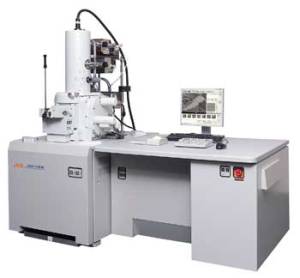Aug 26 2010
JEOL has introduced a unique Scanning Electron Microscope with optics that enable ultrahigh resolution imaging at low kV and high spatial resolution microanalysis.
The Through-the-Lens System (TTLS) combines new objective lens and detector technologies with the proven JEOL in-lens Field Emission Gun. The TTLS is designed to enable imaging of a wide variety of samples, including magnetic materials. The model JSM-7001FTTLS LV also features low vacuum operation and a large specimen exchange airlock.
 JEOL JSM-7001FTTLS LV SEM
JEOL JSM-7001FTTLS LV SEM
In the TTL System, in-lens detectors with energy filtering provide both topography (SE) and Z contrast (BSE) images. Short working distance, low currents, and low kV sensitivity ensure high resolution BSE images. Gentle Beam technology reduces charging and improves resolution, signal-to-noise, and beam brightness, especially at low beam voltages (down to 100V). The TTLS operates at low magnification (10X) with no distortion of the image or the EBSD pattern, allowing collection of large area EBSD maps of large grain materials.
The flexibility of this SEM is displayed in its ability to run in low vacuum (LV) mode for imaging nonconductive samples at high kV and beam currents for a variety of analytical applications that include analysis with EDS, WDS, EBSD, and CL. An optional STEM detector allows imaging of thin samples with sub 0.8nm resolution.
Source: http://www.jeolusa.com/